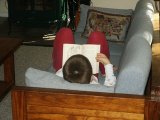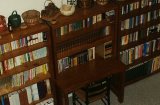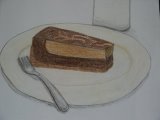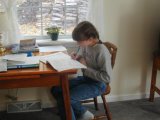
Here is my next book review: Blown to Bits.
Blown to Bits was written by R. M. Ballantyne (1825 - 1894). One of Mr. Ballantyne's more well-known books is Coral Island, A Tale of the Pacific Ocean. He was a popular author in the 1800's and influenced a number of people. His stories are beautiful, full of description, and carefully researched. Also worthy of mention is his Christian faith which comes through his works.
Blown to Bits is a story of the volcano of Krakatoa which blew up in 1883. The hero is one Nigel Roy, a mate on his father's ship the Sunshine. After a storm damages the ship, they land in Batavia in Java and are delayed for several months in repairing the ship. Captain Roy gives Nigel permission or perhaps a command to... well, I'll give it to you in his own words:
" 'Well now, this is how the land lies,' said the old seaman, resting his
elbows on the table and clasping his hands before him. 'As Mr. Moor and
I, with the stooard and men, are quite sufficient to manage the affairs
o' the brig, and as we shall certainly be here for a considerable time
to come, I've made up my mind to give you a holiday. You're young, you
see, an' foolish, and your mind needs improvin'. In short, you want a
good deal o' the poetry knocked out o' you, for it's not like your
mother's poetry by any means, so you needn't flatter yourself--not built
on the same lines by a long way. Well--where was I?'
'Only got the length of the holiday yet, father.'
'Only, indeed. You ungrateful dog! It's a considerable length to get,
that, isn't it? Well, I also intend to give you some money, to enable
you to move about in this curious archipelago--not much, but enough to
keep you from starvation if used with economy, so I recommend you to go
into the town, make general inquiries about everything and everywhere,
an' settle in your mind what you'll do, for I give you a rovin'
commission an' don't want to be bothered with you for some time to
come.' "
And off starts Nigel on his adventures. To begin with, he meets a man named Moses, a black man with whom he immediately becomes friends with. Moses happens to be looking for a companion to accompany himself and the hermit of Rakata (a mountain on the island of Krakatoa) on an expedition. He engages Nigel, and they go over to the island to meet the hermit. Shortly thereafter they set off on their expedition across the seas in an ingenious canoe of the hermit's own invention. After an exciting escape from Malay pirates, a fierce storm in a canoe, and ride from a steamer, they reach the island of Borneo. There they meet the hermit's friend the Professor, an eccentric and amusing gentleman whose chief delight is in chasing "booterflies". Frequent escapades with pirates, orangutans, and tigers form a large part of the adventures hereafter until the shocking end of the hermit's enemy, a terrible pirate captain. By now, the rumblings and explosions of the nearby volcanoes have grown to great proportions. The hermit, Nigel, Moses, return to the island of Krakatoa as it is letting off small explosions. They barely make it off the island again with a few possessions before it erupts. The canoe is tossed up on the deck of a ship by the ensuing waves. To the surprise of all, it is the Sunshine with Nigel's father on board. From the ship, they watch the tremendous volcanic eruption of Krakatoa. The Sunshine is cast on shore of Java and wrecked, but no persons are hurt. Nigel's adventures are almost done with a visit to the remains of the Krakatoa island. Then comes the last chapter, but as that is more of an epilogue, I shall not tell what happens in it. You must find out for yourself.
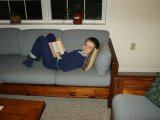 I heartily recommend this book. I have not done it half justice in my review. The descriptions, characters, and humor are things that must be read.
I heartily recommend this book. I have not done it half justice in my review. The descriptions, characters, and humor are things that must be read.There is one objection that may be raised against this book. That is that Moses is called a negro throughout, but I think it is only because of the time in which it was written, because he is described in the highest terms. The hermit considered him a most trusted friend.
And now I will close this review with a song from Moses. It is best to read it out loud to understand it better.
"GO TO WORK."
Oh when de sun am shinin' bright, and eberyt'ing am fair,
Clap on de steam an' go to work, an' take your proper share.
De wurld hab got to go ahead, an' dem what's young and strong
Mus' do deir best, wid all de rest, to roll de wurld along.
De lazy man does all he can to stop its whirlin' round.
If he was king he'd loaf an' sing--and guzzle, I'll be bound,
He always shirk de hardest work, an' t'ink he's awful clebbar,
But boder his head to earn his bread, Oh! no, he'll nebber, nebber.
Chorus--Oh when de sun, etc.
De selfish man would rader dan put out his hand to work,
Let women toil, an' sweat and moil--as wicked as de Turk.
De cream ob eberyt'ing he wants, let oders hab de skim;
In fact de wurld and all it holds was only made for him.
Chorus--Oh when de sun, etc.
So keep de ball a-rollin', boys, an' each one do his best
To make de wurld a happy one--for dat's how man is blest.
Do unto oders all around de t'ing what's good and true,
An' oders, 'turning tit for tat, will do de same to you.
Chorus--Oh when de sun, etc.
